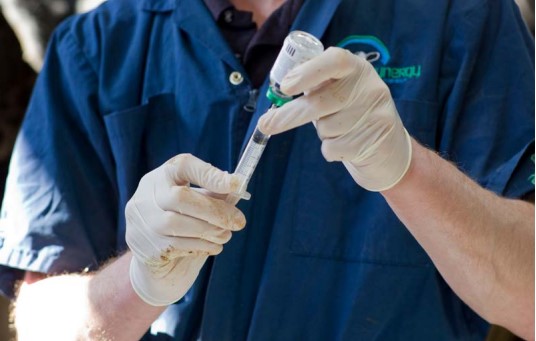- Home
- Knowledge library
- Reducing Use of Veterinary Medicines (PhD)
Reducing Use of Veterinary Medicines (PhD)
Summary
Despite increasing pressure to reduce antimicrobial use (AMU), many UK dairy farms still rely on antimicrobials to maintain a healthy herd. This research aimed to assess the potential of peer-to-peer support through Farmer Action Groups (FAGs) to achieve practical, farmer-led changes to reduce AMU and improve herd health and welfare. FAGs-based on the 'Stable Schools' model used widely in Denmark-harnessed local-level experience and expertise to solve the challenge of reducing AMU.
Study population: 30 diverse dairy farms in Five FAGs across South West England, over 2 year study period.
Key findings:
- Afarmer-led approach was successful in supporting and encouraging a change in practice around AMU on all participating dairy farms.
- All farms implemented at least one recommendation from their Action Plan with an average 54.3% of recommendations were implemented.
- Many recommendations were still ongoing at the end of the study.
- The majority of participating farms (n=27) reduced or eliminated use of highest priority critically important antimicrobials (HPCIAs) over the 2 years.
- Participants spoke highly of the project and benefited from the sharing of knowledge at each meeting.
- Farm walks and facilitated discussions empowered farmers to change practices and farmers gained confidence from the group learning experience.
- The FAGs developed a sense of solidarity from going through a process of change together.
- Knowledge gaps were identified by farmers regarding how their practices around AMU could contribute to AMR, the different types of antimicrobials used and particularly which were HPCIAs.
- The project stimulated an increase in herd health discussions between farmers and veterinarians as a result of the knowledge mobilisation in the FAGs.
- FAGs contributed to a shift away from HPCIAs.
- There is potential for this approach to be scaled-up across the country.
For further information the report is available.
Downloads
41110023 final report 2019About this project
The problem:
Pressures to reduce medicines, particularly antimicrobials, used in food animals are likely to increase from consumers and policy makers, including retailers. To address the challenge of more responsible use of medicines while maintaining or improving dairy herd health and welfare, comprehensive, participatory approaches to welfare interventions and disease prevention may be valuable.
Aims and objectives:
This research project tested and adapted a model developed for reducing medicine use for organic dairy herds through farmers learning groups. The principles were applied in conventional dairy systems and worked through farmer groups to develop novel approaches to more responsible use of antimicrobial medicines on farm and explicitly to inform policy. This project aimed to deliver the following specific outcomes:
1. A tool for auditing and benchmarking responsible medicine use in the context of the farm’s herd health performance co‐developed with farmers.
2. Credible and practical recommendations for policy makers that could deliver reduction in antibiotic use within the existing policy.
Related resources


